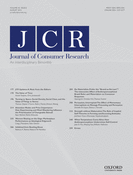-
Views
-
Cite
Cite
Julia D. Hur, Minjung Koo, Wilhelm Hofmann, When Temptations Come Alive: How Anthropomorphism Undermines Self-Control, Journal of Consumer Research, Volume 42, Issue 2, August 2015, Pages 340–358, https://doi.org/10.1093/jcr/ucv017
Close - Share Icon Share
Abstract
We examine how anthropomorphizing a temptation impacts consumer self-control. Six studies show that anthropomorphizing a tempting product impairs self-control not by boosting desire strength but by decreasing consumers’ experience of conflict toward consuming the product—an alarm that signals a need for self-control. As a result, consumers are less likely to initiate self-control and are more likely to indulge in the product. This process occurs because an anthropomorphized product acts as another agent in the self-control dilemma, which decreases the extent to which consumers attribute the cause of and responsibility for their consumption to themselves (i.e., internal attribution).



